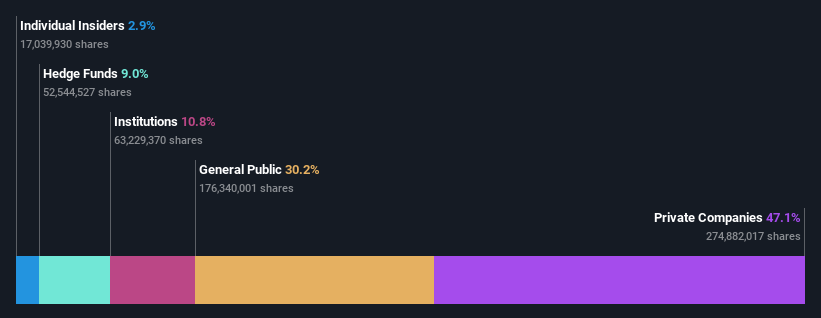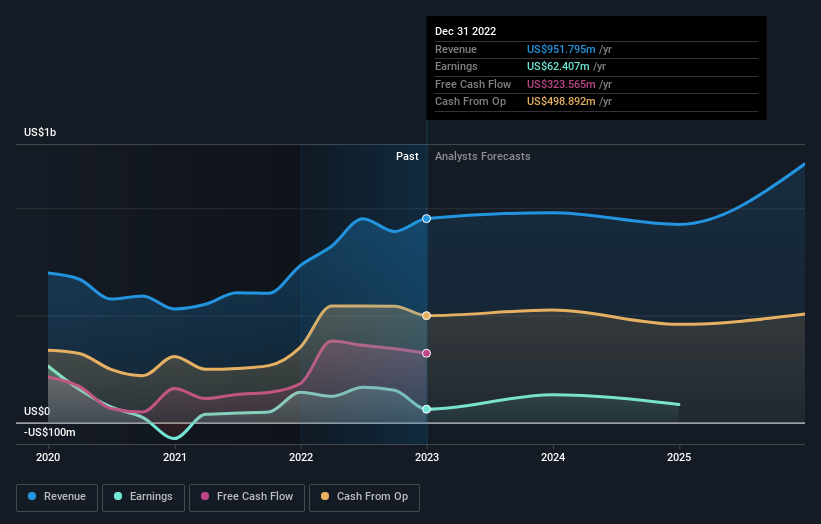Seplat Energy Plc's (LON:SEPL) largest shareholders are private companies with 47% ownership, individual investors own 30%
Key Insights
Significant control over Seplat Energy by private companies implies that the general public has more power to influence management and governance-related decisions
A total of 4 investors have a majority stake in the company with 52% ownership
To get a sense of who is truly in control of Seplat Energy Plc (LON:SEPL), it is important to understand the ownership structure of the business. With 47% stake, private companies possess the maximum shares in the company. In other words, the group stands to gain the most (or lose the most) from their investment into the company.
Meanwhile, individual investors make up 30% of the company’s shareholders.
In the chart below, we zoom in on the different ownership groups of Seplat Energy.
View our latest analysis for Seplat Energy
What Does The Institutional Ownership Tell Us About Seplat Energy?
Many institutions measure their performance against an index that approximates the local market. So they usually pay more attention to companies that are included in major indices.
We can see that Seplat Energy does have institutional investors; and they hold a good portion of the company's stock. This implies the analysts working for those institutions have looked at the stock and they like it. But just like anyone else, they could be wrong. When multiple institutions own a stock, there's always a risk that they are in a 'crowded trade'. When such a trade goes wrong, multiple parties may compete to sell stock fast. This risk is higher in a company without a history of growth. You can see Seplat Energy's historic earnings and revenue below, but keep in mind there's always more to the story.
Our data indicates that hedge funds own 9.0% of Seplat Energy. That's interesting, because hedge funds can be quite active and activist. Many look for medium term catalysts that will drive the share price higher. PT Pertamina (Persero) is currently the company's largest shareholder with 21% of shares outstanding. With 14% and 9.0% of the shares outstanding respectively, Petrolin Group and Sustainable Capital Ltd are the second and third largest shareholders. Additionally, the company's CEO Roger Brown directly holds 0.6% of the total shares outstanding.
Our research also brought to light the fact that roughly 52% of the company is controlled by the top 4 shareholders suggesting that these owners wield significant influence on the business.
Researching institutional ownership is a good way to gauge and filter a stock's expected performance. The same can be achieved by studying analyst sentiments. Quite a few analysts cover the stock, so you could look into forecast growth quite easily.
Insider Ownership Of Seplat Energy
The definition of an insider can differ slightly between different countries, but members of the board of directors always count. The company management answer to the board and the latter should represent the interests of shareholders. Notably, sometimes top-level managers are on the board themselves.
I generally consider insider ownership to be a good thing. However, on some occasions it makes it more difficult for other shareholders to hold the board accountable for decisions.
We can report that insiders do own shares in Seplat Energy Plc. In their own names, insiders own UK£17m worth of stock in the UK£584m company. This shows at least some alignment. You can click here to see if those insiders have been buying or selling.
General Public Ownership
With a 30% ownership, the general public, mostly comprising of individual investors, have some degree of sway over Seplat Energy. This size of ownership, while considerable, may not be enough to change company policy if the decision is not in sync with other large shareholders.
Private Company Ownership
It seems that Private Companies own 47%, of the Seplat Energy stock. It might be worth looking deeper into this. If related parties, such as insiders, have an interest in one of these private companies, that should be disclosed in the annual report. Private companies may also have a strategic interest in the company.
Next Steps:
I find it very interesting to look at who exactly owns a company. But to truly gain insight, we need to consider other information, too. Case in point: We've spotted 2 warning signs for Seplat Energy you should be aware of.
If you are like me, you may want to think about whether this company will grow or shrink. Luckily, you can check this free report showing analyst forecasts for its future.
NB: Figures in this article are calculated using data from the last twelve months, which refer to the 12-month period ending on the last date of the month the financial statement is dated. This may not be consistent with full year annual report figures.
Have feedback on this article? Concerned about the content? Get in touch with us directly. Alternatively, email editorial-team (at) simplywallst.com.
This article by Simply Wall St is general in nature. We provide commentary based on historical data and analyst forecasts only using an unbiased methodology and our articles are not intended to be financial advice. It does not constitute a recommendation to buy or sell any stock, and does not take account of your objectives, or your financial situation. We aim to bring you long-term focused analysis driven by fundamental data. Note that our analysis may not factor in the latest price-sensitive company announcements or qualitative material. Simply Wall St has no position in any stocks mentioned.
Join A Paid User Research Session
You’ll receive a US$30 Amazon Gift card for 1 hour of your time while helping us build better investing tools for the individual investors like yourself. Sign up here

 Yahoo Finance
Yahoo Finance 
